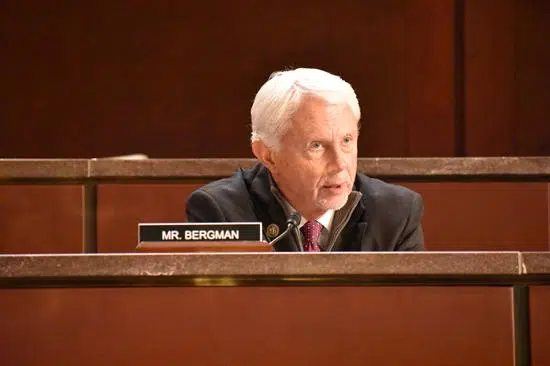This morning, Department of Corrections Director Heidi Washington announced that she will close the Ojibway Correctional Facility in Marenisco in Gogebic County on December 1.
In response, State Rep. Scott Dianda (D-Calumet) issued the following statement:
“This is bad news for the more than 200 employees who support their families thanks to the good jobs that Ojibway Correctional Facility provides for people across the Western U.P. Some of these workers drive from surrounding towns and counties, but now the closest facility they might be able to transfer to would be more than 100 miles away. That’s a tough option for a family up here particularly in the winter months.”
“I voted against the recent state budget because it included a prison closing. Our U.P. communities can’t afford to lose any jobs, and losing more than 200 jobs is going to be devastating for families and our small U.P. towns. This decision puts the state’s bottom line before community safety and working families, and that is appalling. Gov. Rick Snyder and the state Unemployment Insurance Agency need to immediately begin work with these workers, Marenisco Township officials and Gogebic County officials on job placement services and economic development opportunities. These folks put their lives on the line at work every day to keep the rest of us safe. Republicans who think saving a buck is more important than keeping communities safe and helping working families get by need to do whatever it takes to help these folks find good jobs.”
State Sen. Tom Casperson (R-Escanaba) has expressed ongoing concern about prison cost reform, including Tuesday’s announcement to close the Ojibway Correctional Facility located in the Upper Peninsula’s Gogebic County.
Many are hailing the closure as an indication of positive trends in law enforcement; Casperson disagrees.
“This is a game of cups and ball where the state is simply hiding the true costs of closing down prison facilities,” said Casperson. “Our county jail populations are ballooning because of these closures, causing a greater burden on county budgets that are already stretched thin. And that is unacceptable. We need to recognize the true costs of law enforcement in our state, and not simply pass on the burden to our local communities.”
Casperson previously presented a plan to the Michigan Department of Corrections that would have saved the state money while at the same time ensuring local communities are not left to subsidize the closure. However, this was not the desired approach because it failed to promote what Casperson called the false narrative that “recidivism is at an all-time low.”
Casperson said that public safety and the state budget aren’t the only things at stake with this closure.
“The Ojibway facility supported more than 200 employees, as well as all the people in the community who served those workers,” Casperson said. “What are the community of Marenisco Township and Gogebic County going to do now? What about the families who suddenly will be out of a job in four months?
“It is especially frustrating that the significant consequences for the Western U.P. were not considered, especially after this community accepted this responsibility from the state at a time others communities shunned having a prison. There were other options available to the state that would have offered the department cost savings that would not have devastated a local community.
“Consequently, if this decision is left to stand, I am asking that the state join with us in the immediate days ahead to find ways to offer some jobs assistance to the already struggling economy in the Western UP to ensure the community can survive.”
According to the Department of Corrections, the Ojibway Correctional Facility is scheduled to close Dec. 1 of this year. The roughly 800 inmates will be transported to other facilities around the state.
State Rep. Sara Cambensy (D-Marquette) issued the following statement:
“With the Governor’s office not proposing a prison closure in his 2018-2019 budget, and the additional proposed facility closure coming from Senate and House appropriation chairs, I’m concerned about who or what is driving this decision.”
“While all legislators are concerned about our state’s bottom line when allocating taxpayer dollars during our budget negotiations, we also have a responsibility to keep our communities safe. Keeping our communities safe includes not overtaxing our local county jails and police officers who are operating their departments on shoestring budgets with limited staff and financial resources. Our local communities cannot absorb more stress on their public safety departments if we truly don’t have the prison population numbers to warrant the closure of another facility.”
“Therefore, I’m cautious to say this is a necessary and appropriate prison closure when our governor, who manages and works closely with our MDOC director and administration team, did not recommend another prison closure in his budget when he came to the legislature earlier this year.”
Former State Rep. and State Senate candidate Ed McBroom made the following statement:
The 2019 budget, passed in June, called for the closure of another prison in the state but it was unknown until today which facility it would be. The 2019 fiscal year begins October 1, 2018 so the time frame for the shutdown is very fast. State Senator John Proos of south-west Michigan is chairman of Corrections Appropriations in the senate and pushed hard for the closure during debate. Senator Proos, with no prisons in his district, has been a consistent fighter for closures, citing the significant reductions to state prison populations over the last 8 years.
However, , had a different perspective on the closures and Senator Proos’ arguments.
“This closure is another example of the state being both financially dishonest as well as dismissive of the U.P.,” McBroom said in a statement. “We know the reduction in population has more to do with fudging recidivism numbers and sending more prisoners to our county jails than with an actual reduction in incarcerations. This does nothing more than shift the cost from the State to our counties, who cannot afford that shift. And the costs of running Ojibway are not being fairly compared to other facilities because the state is putting undo emphasis on distance rather than taking into account the relatively young age of the facility, security of the location, and proximity to other state facilities nearby.
“Most of all, it is a state run, typical, myopic way of budgeting that ignores the net costs to the state by foisting such a dramatic hurt on a small, already hurting community —a community mind you that invited this prison in when other communities were turning up their noses.”
McBroom has been working with State Senator Tom Casperson since the budget fight began on ways to keep the prison open. Senator Casperson’s office released a statement saying, “We previously presented a plan to corrections that would have saved money while not attacking any facility and ensuring counties are not left subsidizing the closure. However, this was not the approach desired because it failed to promote the misplaced notion that ‘recidivism is at an all time low.’ I am very disappointed in this news and frustrated that the significant consequence that will result to the Western U.P. was not considered, especially after this community accepted this responsibility from the state at a time other communities shunned having a prison – the lack of recognition is a slap in the face for the whole U.P.”






















